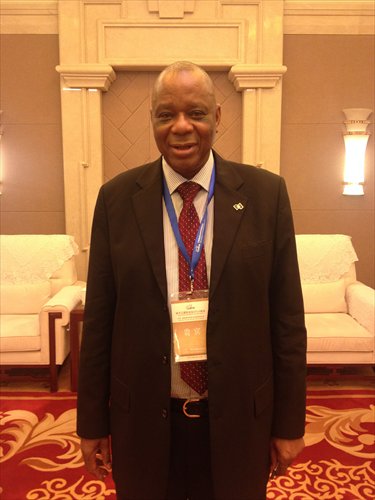China needs patience in Africa deals

Sasara Chasala George Photo: Wang Wenwen /GT
Editor's Note:China's presence in Africa over the past few decades has won it both applause and criticism. How do Africans view China's role in their continent? At the Johannesburg Forum on China-Africa Cooperation Summit in December, China has pledged to provide impetus for Africa's industrialization. How can China facilitate this process and how is Africa responding? At the Jiangsu-Southern African Development Community (SADC) Forum of Investment and Development held in Nanjing recently, Global Times (GT) reporter Wang Wenwen interviewed Sasara Chasala George (George), ambassador of the Republic of Botswana to China and chair of SADC ambassadors, on China-Africa relations.
GT: Some analysts believe China's overcapacity in heavy industries offers a chance for cooperation between China and Africa. What do you think?
George: I think it is a welcome opportunity. Developing countries, especially African countries, would like to see people with overcapacity transit it to Africa and take advantage of the undercapacity of Africa and produce in Africa. But during this process, we should avoid the mistakes people made in the past.
We have to protect the environment. Most importantly, the public should play a vital role. For projects to be sustainable, the newcomers must make sure that the locals protect the projects by owning them and being part of them.
You have to get what Africa needs. We don't want waste. Africa has no capacity or technology to deal with waste. We have to be careful not to get something that we cannot deal with.
China, with its good heart, will not transfer to Africa the bad things of China because China wants a good name in the world.
China is the second largest economy and a major political power in the world. It has to be responsible. The responsible thing is to transfer to Africa sustainable projects that can help Africa develop.
GT: What are the differences between China and the US in investment?
George: The developed countries, except the US, have a lot of experience in Africa because they colonized Africa.
China and the US have different experiences.
If you look at the investment mode of the two countries, the US invests in soft assets such as human resource development and health. The US also educates and trains people.
But China came and has invested so much in hard infrastructure such as roads and railways, which are vital for our economy.
I would say both have done a good job. It is two sides of the same coin. For me, they are complementary.
Different players should come together and find a modest and in-between way to help Africa. They should bring that goodness together and see what they can do with it.
GT: The presence of Chinese companies in Africa has drawn some criticism. What lessons can they learn from it?
George: Chinese companies do not have the political attitude of colonizing us. The people who have it are those who used to colonize us. When I was in Europe, I felt that people there still think of themselves as our masters.
The only thing China does not have is patience. Chinese are working so hard. Instead of studying us and encouraging people to work hard, they get impatient.
We have social norms in Africa. For instance, we have to go to church. But Chinese don't. If Africans ask for one day off, the Chinese think it is a waste of time. But for African people, it is very important to go and pray.
The Chinese management needs to understand the social and cultural behavior of the people whose country they are going to.
If I come to China as a manager, I have to understand the Chinese that want to take their lunch at 11:30 instead of as when in Botswana, we eat lunch at 1 pm.
GT: SADC aims to achieve integration. As chair of SADC ambassadors this year, what is your expectation toward the process?
George: I don't think we are very far along but I hope I can see it with my lifetime.
In Africa, we are the most integrated. If you look at the SADC region, historically people in southern Africa stayed together.
The last colonial battle we were united to fight was between Mozambicans and Portuguese.
We are most interconnected in power. We can sell grid power to Mozambique. We are most connected by roads. We are trying to build railways now.
We meet often both at the ministerial and the summit of head of state level. Every year we hold a summit and we can have two or three emergency summits in all sectors such as water, energy and health.
Our aim is to have a free trade zone or even a single economic bloc like the EU. But obstacles remain.
I spent more than 10 years in the EU and I found the situation is evolving. There was excitement when it came to the Schengen visa because you can travel everywhere. But it also offers leeway for terrorists to cross the border between regional countries.
In addition, once we have a union, sovereignty will be lessened. There are still people who want higher sovereignty. We have to make sure that some of the laws have to be subordinate to the original laws.